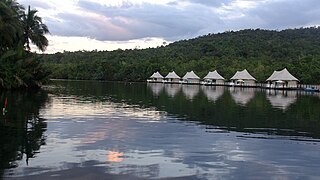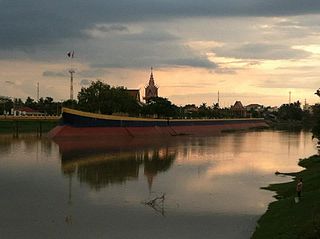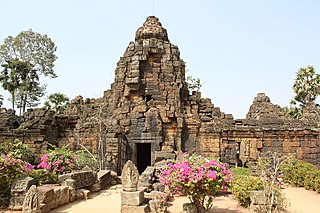Related Research Articles

Cambodia, officially the Kingdom of Cambodia, is a country located in the southern portion of the Indochina peninsula in Southeast Asia. It is 181,035 square kilometres in area, bordered by Thailand to the northwest, Laos to the northeast, Vietnam to the east and the Gulf of Thailand to the southwest.

Kampot is a province (khaet) of Cambodia. It borders the provinces of Koh Kong and Kampong Speu to the north, Takeo and Kep and Vietnam to the east and Sihanoukville to the west. To its south it has a coastline of around 45 km on the Gulf of Thailand. It is rich in low arable lands and has abundant natural resources. Its capital is Kampot town.

Koh Kong is a province (khaet) of Cambodia. The name means 'Kŏng Island Province'. Its capital is Khemarak Phoumin. The province was called Patchan Khiri Khet Province from 1795 to 1904.

Pursat is a province (khaet) of Cambodia. It is in the western part of the country and borders clockwise from the north: Battambang Province, the Tonlé Sap, Kampong Chhnang Province, Kampong Speu Province, Koh Kong Province, and Thailand. It lies between the Tonle Sap and the northern end of the Cardamom Mountains. The Pursat River bisects the province, running from the Cardamoms in the west to the Tonle Sap in the east.

Ratanakiri or Ratanak Kiri, is a province of northeast Cambodia. It borders the provinces of Mondulkiri to the south and Stung Treng to the west and the countries of Laos and Vietnam to the north and east, respectively. The province extends from the mountains of the Annamite Range in the north, across a hilly plateau between the Tonle San and Tonle Srepok rivers, to tropical deciduous forests in the south. In recent years, logging and mining have scarred Ratanakiri's environment, long known for its beauty.

Takeo is a province (khaet) of Cambodia. Located in the south of Cambodia to the west of Bassac River, Takeo borders the provinces of Kampot to the west, Kampong Speu to the northwest and Kandal to the north and east. Its southern boundary is the international border with Vietnam. The provincial capital, recently known as the provincial town Doun Kaev, is a small city with a population of 39,186.

Battambang or Krong Battambang is the capital city of Battambang province in northwestern Cambodia.

Kampong Chhnang is the capital city of Kampong Chhnang Province, in central Cambodia.

Education in Cambodia is controlled by the state through the Ministry of Education in a national level and by the Department of Education at the provincial level. The Constitution of Cambodia establishes that the state shall protect and upgrade citizen's rights to quality education at all levels, guaranteeing that all citizens have equal opportunity to earn a living. The state shall adopt an education program "according to the principle of modern pedagogy including technology and foreign languages," as well as the state controls public and private schools and classrooms at all levels. The Cambodian education system includes pre-school, primary, general secondary, higher education and non-formal education. The education system includes the development of sport, information technology education, research development and technical education. School enrollment has increased during the 2000s in Cambodia. USAID data shows that in 2011 primary enrollment reached 96% of the child population, lower secondary school 34% and upper secondary 21%.

Chamkar Leu District is a district (srok) of Kampong Cham Province, Cambodia. The district capital is Chamkar Leu town. The town is located at the junction of National Roads 71 and 222 around 48 kilometres (30 mi) north east of the provincial capital at Kampong Cham city. The district is significant producer of rubber, both for domestic consumption and for export. Two large rubber co-operatives, Chamkar Andong Plantation and Chamkar Leu Plantation are located in the district. At 6,000 hectares, the state-owned Chamkar Andong plantation is one of the largest in the country.

Koh Sotin District is a district (srok) located in Kampong Cham Province, Cambodia. The district capital is Chi Haer town located around 10 kilometres south of the provincial capital of Kampong Cham by water, but some 42 kilometres by road. The district borders on the southern bank of the Mekong River and includes the islands of Koh Sothin and Koh Mitt in its area.

Andoung Meas District is a district in north-eastern Cambodia, located in Ratanakiri Province, Population 6,896 (1998)

Bar Kaev District is a district in north-eastern Cambodia, located in Ratanakiri Province, Population 11,758 (1998). It contains six communes.

Cambodia is one of the world's most forest endowed countries that has not yet been drastically deforested. However, massive deforestation for economic development threatens its forests and ecosystems. As of 2005, the country has one of the highest rates of deforestation in the world, third only to Nigeria and Vietnam, according to the United Nations Food and Agriculture Organization (FAO).

Kampong Siem District is a district (srok) located in Kampong Cham Province, Cambodia. The district surrounds the provincial capital Kampong Cham City. The administrative center of the district locates not far from the Provincial capital of Kampong Cham in Ampil Leu Village, Ampil Commune about 3 km west from the center of Kampong Cham city on National Highway 7 and is 120 kilometres by road from Phnom Penh. The district borders on the western bank of the Mekong for most of its length.

Beng Per Wildlife Sanctuary is a 2,494.08 km2 (962.97 sq mi) large protected area in northern Cambodia that was established in 1993.

The Kulen Promtep Wildlife Sanctuary is the largest protected area in Cambodia and was set aside to protect the critically endangered, possibly extinct Kouprey.

The Lower Se San 2 Dam is a hydroelectric dam under development on the Se San River in Stung Treng Province, northeastern Cambodia. The Se San River is a major tributary of the Mekong River. The dam site is located 25 kilometres (16 mi) east of the provincial capital, also named Stung Treng. The first turbine began producing electricity in November 2017. The dam was officially opened on December 18, 2018.
Water supply in Cambodia is characterized by a low level of access in rural areas compared to relatively high access to an improved water source in urban areas. In 2015, 76% of the population had access to "improved" water, 100% in urban areas and 76% in rural areas. Still, in 2015, around 9 million did not have access to "improved" water. Within the government, urban water supply policy is the responsibility of the Ministry of Industry, Mines and Energy. Service provision in urban areas is the responsibility of two water utilities in the largest cities, the Phnom Penh Water Supply Authority (PPWSA) and the Siem Reap Water Supply Authority (SRWSA), 11 Provincial Water Supply Authorities as well as 147 smaller utilities. The Department of Rural Water Supply (DRWS) and Department of Rural Health Care (DRHC) of the Ministry of Rural Development are responsible for rural water supply for the smaller towns and villages with less than 1,000 households.
The World Bank is an international financial institution that provides loans and grants to the governments of poorer countries for the purpose of pursuing capital projects. It comprises two institutions: the International Bank for Reconstruction and Development (IBRD), and the International Development Association (IDA). The World Bank is a component of the World Bank Group.
References
- ↑ Cham Prasidh. "Message from the Minister" Archived 2008-12-04 at the Wayback Machine . Cambodia National and Provincial Resources Data Bank (December 12, 2003).
- 1 2 "Private Sector Assessment for the Kingdom of Cambodia". Development Consulting International, for the Asian Development Bank (December 2003).